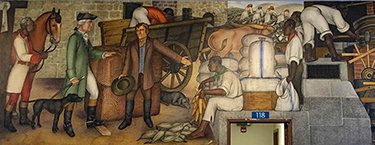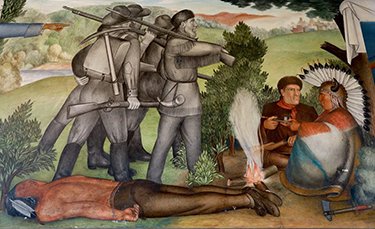Left-wing Haters Pulled Down Lee’s Monument in Richmond Today
Richmond, Robert E. Lee, Virginia, War on Monuments

Lee Monument, Richmond removed 8 September 2021.
“Meantime he has a nobler monument than can be built of marble or of brass. His monument is the adoration of the South; his shrine is in every Southern heart.”
–Thomas Nelson Page
“He was a foe without hate; a friend without treachery; a soldier without cruelty; a victor without oppression, and a victim without murmuring. He was a public officer without vices; a private citizen without wrong; a neighbour without reproach; a Christian without hypocrisy, and a man without guile. He was a Caesar, without his ambition; Frederick, without his tyranny; Napoleon, without his selfishness, and Washington, without his reward.”
–Benjamin Harvey Hill (former Confederate Senator from Georgia), 1874.
————————-
A speech given by President Jefferson Davis at the formation of the Lee Monument Association in Richmond, following the death of General Robert E. Lee.
[Richmond, Virginia – November 3, 1870]
“Soldiers and sailors of the Confederacy, comrades and friends”:
Assembled on this sad occasion, with hearts oppressed with the grief that follows the loss of him who was our leader on many a bloody battle-field, a pleasing though melacholy spectacle is presented. Hitererto, and in all times, men have been honored when successful, but here is the case of one who, amid disaster, went down to his grave, and those who were his companions in misfortune have assembled to honor his memory. It is as much an honor to you who give as to him who receives, for above the vulgar test of merit you show yourselves competent to discriminate between him who enjoys and he who deserves success.
Robert E. Lee was my associate and friend in the military academy, and we were friends until the hour of his death. We were associates and friends when he was a soldier and I a congressman; and associates and friends when he led the armies of the Confederacy and I presided in its Cabinet. We passed through many sad scenes together, but I cannot remember that there was ever aught but perfect harmony between us. If ever there was difference of opinion it was dissipated by discussion, and harmony was the result. I repeat, we never disagreed, and I may add that I never in my life saw in him the slightest tendency to self-seeking. It was not his to make a record, it was not his to shift blame to other shoulders; but it was his with an eye fixed upon the welfare of his country, never faltering to follow the line of duty to the end. His was the heart that braved every difficulty; his was the mind that wrought victory out of defeat.
He has been charged with “want of dash.” I wish to say that I never knew Lee to falter to attempt anything ever man could dare. An attempt has also been made to throw a cloud upon his character because he left the army of the United States to join in the struggle for the liberty of his State. Without trenching at all upon politics, I deem it my duty to say one word in reference to this charge. Virginian born, descended from a family illustrious in Virginia’s annals, given by Virginia to the service of the United States, he represented her in the Military Academy at West Point. He was not educated by the Federal Government, but by Virginia; for she paid her full share for the support of that institution, and was entitled to demand in return the services of her sons. Entering the army of the United States, he represented Virginia there also, and nobly. On many a hard-fought field Lee was conspicuous, battling for his native State as much as for the Union. He came from Mexico crowned with honors, covered by brevets, and recognized, young as he was, as one of the ablest of his country’s soldiers. And to prove that he was estimated then as such, let me tell you that when Lee was a captain of engineers stationed in Baltimore the Cuban Junta in New York selected him to be their leader in the struggle for the independence of their native country. They were anxious to secure his services, and offered him every temptation that ambition could desire. He thought the matter over, and, I remember, came to Washington to consult me as to what he should do, and when I began to discuss the complications which might arise from his acceptance of the trust he gently rebuked me, saying that this was not the line upon which he wished my advice, the simple question was “Whether it was right or not.” He had been educated by the United States, and felt wrong to accept place in the army of a foreign power. Such was his extreme delicacy, such was the nice sense of honor of the gallant gentleman whose death we deplore. But when Virginia withdrew – the State to whom he owed his first and last allegiance – the same nice sense of honor led him to draw his sword and throw it in the scale for good or for evil. Pardon me for this brief defence of my illustrious friend.
When Virginia joined the Confederacy, Robert Lee, the highest officer in the little army of Virginia, came to Richmond, and not pausing to inquire what woud be his rank in the service of the Confederacy, went to Western Virginia under the belief that he was still an officer of the State. He came back, carrying the heavy weight of defeat and unappreciated by the people whom he served, for they could not know, as I knew, that if his plans and orders had been carried out the result would have been victory rather than retreat. You did not know, for I would not have known it had he not breathed it in my ear only at my earnest request, and begging that nothing be said about it. The clamor which then arose followed him when he went to South Carolina, so that it became necessary on his going to South Carolina to write a letter to the Governor of that State, telling him what manner of man he was. Yet, through all this, with a magnanimity rarely equalled, he stood in silence, without defending himself or allowing others to defend him, for he was unwilling to offend any one who was wearing a sword and striking blows for the Confederacy.
Mr. Davis then spoke of the straits to which the Confederacy was reduced, and of the danger to which her capital was exposed just after the battle of Seven Pines, and told how General Lee had conceived and executed the desperate plan to turn their flank and rear, which, after seven days of bloody battle, was crowned with the protection of Richmond, while the enemy was driven far from the city. The speaker referred also to the circumstances attending General Lee’s crossing the Potomac and the march into Pennsylvania. He (Mr. Davis) assumed the responsibility for that movement. The enemy had long been concentrating his force, and it was evident that if they continued their steady progress the Confederacy would be overwhelmed. Our only hope was to drive him to the defence of his own capital, we being enabled in the meantime to reinforce our shattered army. How well Gen. Lee carried out that dangerous experiment need not be told. Richmond was relieved, the Confederacy was relieved, and time was obtained, if other things had favored, to reinforce the army.
But, said Mr. Davis, I shall not attempt to review the military career of our fallen Chieftain. Of the man, how shall I speak? He was my friend, and in that word is included all that I could say of any man. His moral qualities rose to the height of his genius. Self denying – always intent upon the one idea of duty – self-controlled to an extent that many thought him cold. His feelings were really warm, and his heart melted freely at the sight of a wounded soldier or the story of the sufferings of the widow and orphan. During the war he was ever conscious of the inequality of the means at his control; but it was never his to complain or to utter a doubt – It was always his to do. When in the last campaign he was beleaguered at Petersburg, and painfully aware of the straights to which we were reduced, he said: “With my army in the mountains of Virginia I could carry on this war for twenty years longer.” His men exhausted and his supplies failing, he was unable to carry out his plans. An untoward event caused him to anticipate the movement and the Army of Northern Virginia was overwhelmed. But in the surrender he anticipated conditions that have not been fulfilled – he expected his army to be respected and his paroled soldiers to be allowed the enjoyments of life and property. Whether these conditions have been fulfilled, let others say.
Here he now sleeps in the land he loved so well, and that land is not Virginia only, for they do injustice to Lee who believe he fought only for Virginia. He was ready to go anywhere, on any service for the good of his country, and his heart was as broad as the fifteen States struggling for the principles that our forefathers fought for in the Revolution of 1776. He is sleeping in the same soil with the thousands who fought under the same flag, but first offered up their lives. Here the living are assembled to honor his memory, and there the skeleton sentinels keep watch over his grave. This citizen! this soldier! this great general! this true patriot! left behind him the crowning glory of a true Christian. His Christianity ennobled him in life, and affords us grounds for the belief that he is happy beyond the grave.
But, while we mourn the loss of the great and the true, drop we also tears of sympathy with her who was his help-meet in life – the noble woman who, while her husband was in the field leading the Army of the Confederacy, though an invalid herself, passed the time in knitting socks for the marching soldiers! A woman fit to be the mother of heroes – and heroes are descended from her. Mourning with her, we can only offer the consolation of a Christian. Our loss is not his, but he now enjoys the rewards of a life well spent and a never wavering trust in a risen Saviour. This day we unite our words of sorrow with those of the good and great throughout Christendom, for his fame is gone over the water – his deeds will be remembered; and when the monument we build shall have crumbled into dust, his virtues will still live, a high model for the imitation of generations yet unborn.
–From The Papers of Jefferson Davis, Volume 12, pp 502-506. Transcribed from the Richmond Dispatch, November 4, 1870.








